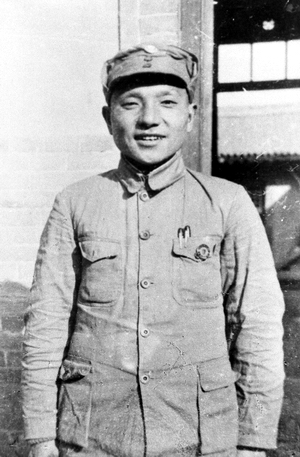Deng Xiaoping
Deng Xiaoping (22 August 1904 – 19 February 1997) was a Chinese revolutionary and statesman who served as the paramount leader of the People's Republic of China from December 1978 to November 1989. He was the architect of modern China's economic reforms and opening up to the global market, which transformed the country into one of the world's fastest-growing economies.
Early Life and Education[edit | edit source]
Deng Xiaoping was born in Guang'an, Sichuan province. He studied and worked in France in the 1920s, where he became involved in the communist movement. Deng later attended the Moscow Sun Yat-sen University in the Soviet Union, where he furthered his education in Marxist theory.
Political Career[edit | edit source]
Deng Xiaoping joined the Chinese Communist Party (CCP) in 1923. He played a significant role in the Long March and held various military and political positions during the Chinese Civil War and the Second Sino-Japanese War. After the establishment of the People's Republic of China in 1949, Deng held several key positions, including Vice Premier and Secretary-General of the CCP.
Cultural Revolution[edit | edit source]
During the Cultural Revolution, Deng was purged twice by Mao Zedong but was later rehabilitated. He regained power in 1977, following Mao's death and the arrest of the Gang of Four.
Economic Reforms[edit | edit source]
Deng Xiaoping is best known for his economic reforms, which began in 1978. He introduced policies that shifted China from a planned economy to a more market-oriented economy. These reforms included the establishment of Special Economic Zones (SEZs), the decollectivization of agriculture, and the encouragement of foreign investment. His famous saying, "It doesn't matter whether a cat is black or white, as long as it catches mice," symbolized his pragmatic approach to economic policy.
Foreign Policy[edit | edit source]
Deng Xiaoping also played a crucial role in improving China's foreign relations. He normalized relations with the United States in 1979 and initiated the One Country, Two Systems policy, which allowed Hong Kong and Macau to maintain their economic and administrative systems after their return to China.
Legacy[edit | edit source]
Deng Xiaoping's policies laid the foundation for China's rapid economic growth and modernization. He is often credited with transforming China into a global economic power. However, his tenure was also marked by the Tiananmen Square Massacre in 1989, which led to international condemnation.
Related Pages[edit | edit source]
- Chinese Communist Party
- Mao Zedong
- Cultural Revolution
- Special Economic Zones
- Tiananmen Square Massacre
- One Country, Two Systems
- People's Republic of China
See Also[edit | edit source]
- History of the People's Republic of China
- Economic history of China (1949–present)
- Politics of China
Search WikiMD
Ad.Tired of being Overweight? Try W8MD's physician weight loss program.
Semaglutide (Ozempic / Wegovy and Tirzepatide (Mounjaro / Zepbound) available.
Advertise on WikiMD
|
WikiMD's Wellness Encyclopedia |
| Let Food Be Thy Medicine Medicine Thy Food - Hippocrates |
Translate this page: - East Asian
中文,
日本,
한국어,
South Asian
हिन्दी,
தமிழ்,
తెలుగు,
Urdu,
ಕನ್ನಡ,
Southeast Asian
Indonesian,
Vietnamese,
Thai,
မြန်မာဘာသာ,
বাংলা
European
español,
Deutsch,
français,
Greek,
português do Brasil,
polski,
română,
русский,
Nederlands,
norsk,
svenska,
suomi,
Italian
Middle Eastern & African
عربى,
Turkish,
Persian,
Hebrew,
Afrikaans,
isiZulu,
Kiswahili,
Other
Bulgarian,
Hungarian,
Czech,
Swedish,
മലയാളം,
मराठी,
ਪੰਜਾਬੀ,
ગુજરાતી,
Portuguese,
Ukrainian
Medical Disclaimer: WikiMD is not a substitute for professional medical advice. The information on WikiMD is provided as an information resource only, may be incorrect, outdated or misleading, and is not to be used or relied on for any diagnostic or treatment purposes. Please consult your health care provider before making any healthcare decisions or for guidance about a specific medical condition. WikiMD expressly disclaims responsibility, and shall have no liability, for any damages, loss, injury, or liability whatsoever suffered as a result of your reliance on the information contained in this site. By visiting this site you agree to the foregoing terms and conditions, which may from time to time be changed or supplemented by WikiMD. If you do not agree to the foregoing terms and conditions, you should not enter or use this site. See full disclaimer.
Credits:Most images are courtesy of Wikimedia commons, and templates, categories Wikipedia, licensed under CC BY SA or similar.
Contributors: Prab R. Tumpati, MD






